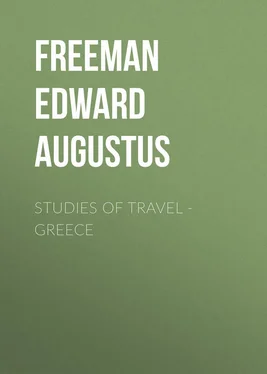Edward Freeman - Studies of Travel - Greece
Здесь есть возможность читать онлайн «Edward Freeman - Studies of Travel - Greece» — ознакомительный отрывок электронной книги совершенно бесплатно, а после прочтения отрывка купить полную версию. В некоторых случаях можно слушать аудио, скачать через торрент в формате fb2 и присутствует краткое содержание. Жанр: foreign_antique, foreign_prose, на английском языке. Описание произведения, (предисловие) а так же отзывы посетителей доступны на портале библиотеки ЛибКат.
- Название:Studies of Travel - Greece
- Автор:
- Жанр:
- Год:неизвестен
- ISBN:нет данных
- Рейтинг книги:5 / 5. Голосов: 1
-
Избранное:Добавить в избранное
- Отзывы:
-
Ваша оценка:
- 100
- 1
- 2
- 3
- 4
- 5
Studies of Travel - Greece: краткое содержание, описание и аннотация
Предлагаем к чтению аннотацию, описание, краткое содержание или предисловие (зависит от того, что написал сам автор книги «Studies of Travel - Greece»). Если вы не нашли необходимую информацию о книге — напишите в комментариях, мы постараемся отыскать её.
Studies of Travel - Greece — читать онлайн ознакомительный отрывок
Ниже представлен текст книги, разбитый по страницам. Система сохранения места последней прочитанной страницы, позволяет с удобством читать онлайн бесплатно книгу «Studies of Travel - Greece», без необходимости каждый раз заново искать на чём Вы остановились. Поставьте закладку, и сможете в любой момент перейти на страницу, на которой закончили чтение.
Интервал:
Закладка:
Edward A. Freeman
Studies of Travel - Greece
Preface
The papers that have been brought together in these small volumes are the results of three several journeys made by my father in Greece and Italy. He visited Greece for the first time in 1877, but of the papers written in that year, which appeared in the Saturday Review , only those on Corfu have been reprinted. They form part of the volume of Sketches from the Subject and Neighbour Lands of Venice , in the preface to which work the hope was held out that some out of many papers on the more distant Greek lands might one day be put together. It has been thought that these papers will not prove the less welcome that they must now lack the re-casting that my father would undoubtedly have given to them. Since his Greek journey was made, fresh light has been thrown on many points by the German excavations at Olympia as well as by those conducted by the Greeks themselves on the Athenian Akropolis, at Eleusis and elsewhere.
The papers on the two Italian journies of 1881 and 1883 also stand as they were written with the exception of a few verbal alterations which have seemed needful in such a reproduction of what was originally intended for the columns of a newspaper.
I have to thank the editors of the Saturday Review , the Guardian , and the Pall Mall Gazette for their courtesy in allowing the reprint of these articles which have appeared in their pages.
Florence Freeman,Alicante:
January 17, 1893.
Round Peloponnêsos
The traveller who enters the older Hellenic world by way of Corfu, and who leaves that island by an evening steamer, will awake the next morning within a region which even modern geography and politics allow to be wholly Hellenic. As long as light serves him, he still keeps along the channel which divides free Corfu from enslaved Epeiros; night cuts him off from the sight of the mouth of the Ambrakian Gulf, and of the point where modern diplomacy has decreed that Greek nationality shall, as far as diplomacy can affect such matters, come to an end. The next morning’s dawn finds him off the mouth of the outer Corinthian Gulf. To the east he is shown the position, on one side, of Patras, the old Achaian city which St. Andrew a thousand years back so manfully defended against Slave and Saracen, on the other side, of Mesolongi, whose fame belongs wholly to our own day. We call up the two sieges — the one where the civilian Mavrokordatos, the one hero whom the Fanariot aristocracy gave to the cause of Greece, beat back the Ottoman from its mud walls; the other made more famous still by that fearful sally of the besieged, when, like the men of Ithômê or Eira, they cut their way through the thickest bayonets of the Egyptian invader. There may be some to whom the record of those great deeds may be an unknown tale, but who may yet remember how Mesolongi saw the last and worthiest days of the life of Byron. Of Patras, of Mesolongi, however, we have hardly so much as a distant glimpse; we are told where they are, and that is all. For a while, too, the Peloponnesian coast itself is more distant and less attractive than the islands to the west of it, now parts, no less than Peloponnêsos itself, of the Hellenic realm. Yet we may remember that, as we pass by the Eleian shore — Βουπράσιόν τε καὶ Ἤλιδα δῖαν, while we are shown where lies the path to Olympia, we are now passing by the true Morea , the land which once distinctively bore that name before it gradually spread over the whole peninsula. The mainland as yet hardly attracts us. The dawn has hardly given way to full sunlight as we see Ithakê fade away in the distance, while Kephallênia lifts her bold height full before us. Half the Odyssey rushes on our memory, and the memory of some may be English enough to remember the happy description of our own Ælfred, how Aulixes — his form of Odysseus — was king of two kingdoms, Ithakê and something else, which he held under the casere Agamemnôn. A happy power of seeing the analogies between the institutions of his own day and those of remote ages enabled the West-Saxon King who had seen Rome in his childhood, the prince under whom English, Welsh, and Danish rulers held their kingdoms, to understand the imperial position of the lord of many islands and of all Argos better perhaps than it was understood again till the light of comparative research broke on our own age. We pass by, hoping for some future chance of prying into the geographical difficulties of the Homeric Ithakê, but feeling at all events that it is a stirring moment when we look on islands which legend at least pictures to us as the realm of Odysseus, and in seeing which we may take in a lesson of comparative politics from the noblest ruler of our own people.
Still the insular side is more prominent than the peninsular. Zakynthos, Zante, the isle of flowers, the flower of the Levant, plays no great part in Hellenic history, but as the height of Kephallênia passes away, the beautiful island, with its hills, its valleys, its city spread along the shore and climbing up the mountain-side, is the chief object to draw the eye to itself as long as it remains in sight. It is not till we have passed the curve of the Kyparissian gulf, not till we have passed the great islands, that the coast itself becomes the main object of study. For a study it is, whether in geography, in history, or in simple contemplation of the grand coast-line with the inland mountains soaring above all, and changing their seeming geographical position with the various shiftings of the vessel’s course. The snow-capped height of Pentedaktylos, once Ta getos, rises over all, seen from this point and from that, but always suggesting the same thought, and commonly bringing with its mention the same answer — There lies Sparta. The shape of southern Peloponnêsos lends itself well to a coasting survey of this kind. The three long fingers in which the peninsula ends, and the two deep gulfs between them, allow the whole country to be seen as in a map, and allow most objects to be seen from several points, and therefore to assume several shapes. From Zante to Cerigo — a name which can hardly be a corruption, but which must have by some process supplanted the earlier Kythêra — the coast-line is everything. Islands there are not a few, but they are small islands near to the coast, entering into the general scenery of the coast, and, near as they are, some of them were, like Cerigo itself, part of the dominion of Venice and of the powers which stepped into the place of Venice. Any map earlier than the cession of the Ionian Islands to Greece will show a boundary passing between the coast and several islands which seem to lie within a stone’s throw of it. Along the whole line, the possessors of the mainland, first Ottoman, then Greek, were hemmed in, and as it were blockaded, by a series of floating outposts planted off their shores by the successive possessors of the Seven Islands. One is apt, in using a map of the days of “the Protection,” to mistake the odd-looking frontier drawn in the sea for the probable course of the steamer. Now the frontier is gone; the great islands and the tributary islets all form part of the same kingdom as the mainland. All are now Hellenic in every sense, yet the most striking object in the journey brings forcibly to the mind how recent and artificial is the modern use of the Hellenic name. Tainaros runs far into the sea, as it did when the temple of Poseidôn crowned its height, and when the Helot refugee sought shelter under his protection from his Spartan master. Behind it rises Pentedaktylos, or rather Tainaros carries on Pentedaktylos into the sea. All the folk of those heights called themselves Hellênes in the old days, and all call themselves Hellênes now.
Читать дальшеИнтервал:
Закладка:
Похожие книги на «Studies of Travel - Greece»
Представляем Вашему вниманию похожие книги на «Studies of Travel - Greece» списком для выбора. Мы отобрали схожую по названию и смыслу литературу в надежде предоставить читателям больше вариантов отыскать новые, интересные, ещё непрочитанные произведения.
Обсуждение, отзывы о книге «Studies of Travel - Greece» и просто собственные мнения читателей. Оставьте ваши комментарии, напишите, что Вы думаете о произведении, его смысле или главных героях. Укажите что конкретно понравилось, а что нет, и почему Вы так считаете.











